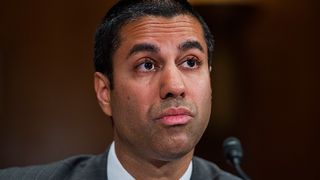FCC's Pai Rescinds Lifeline Eligibilities

FCC chairman Ajit Pai has signaled the commission will be looking carefully at applicants for broadband subsidies.
Among the items from former chairman Tom Wheeler's last few weeks in office that new chairman Ajit Pai is rolling back is the designation of nine telecoms as eligible for Lifeline broadband subsidies, which are the subsidies for basic connectivity for low-income residents.
Spot On Networks, Boomerang Wireless, KonaTel, STS Media (FreedomPop), Applied Research Designs, Kajeet, Liberty Cablevision of Puerto Rico, Northland Cable Television, and Wabash Independent Networks were all approved for eligibility in either December or January by the Wireline Competition Bureau.
On Feb. 3, Pai's acting bureau chief revoked the eligibility and accompanying streamlined treatment, citing a National Tribal Telecommunications Association petition to reverse the eligibility on some of the companies, and because it would "promote program integrity by providing the Bureau with additional time to consider measures that might be necessary to prevent further waste, fraud, and abuse in the Lifeline program."
Pai complained that the FCC under Wheeler had failed to sufficiently root out such abuse.
Citing what it said were "shortcomings in the Bureau’s prior orders" and "procedural failings" including allegedly not informing tribal governments that they were seeking eligibility from the FCC, acting bureau chief Kris Montieth said the bureau "cannot conclude at this time that LBP designations are in the public interest for any of the entities…"
The message seemed to be that the Pai administration would review such applications more thoroughly for potential abuses, but others saw it as a way to target a program Pai has criticized.
Broadcasting & Cable Newsletter
The smarter way to stay on top of broadcasting and cable industry. Sign up below
“I’m deeply disappointed by the FCC’s aggressive actions against consumer protections," said Rep. Frank Pallone (D-N.J.), ranking member of the House Energy & Commerce Committee. "The FCC’s decision to seriously hamstring the Lifeline program — which helps millions of Americans stay connected through access to basic communications like mobile phones and internet service — needlessly punishes the most vulnerable consumers. I had hoped that our Democratic committee staff report refuting the exaggerated claims of waste, fraud, and abuse would put a stop to efforts to gut this program that is so vital for struggling families. In making this decision, the FCC’s order relies on then-Commissioner Ajit Pai’s own testimony before our Committee last year, but at that same hearing he admitted that the FCC had not yet found any evidence of fraud in the Lifeline program. I urge the FCC to immediately reconsider this baseless action, and get to work helping Americans stay connected, rather than ripping phones from those who need them most.”
“Unfortunately, Chairman Pai’s action is a continuation of his previous efforts to vilify a program to help low-income families gain affordable access to broadband and telephone service. In his first speech to the FCC staff as chairman, Pai promised he would close the digital divide by helping the ‘private sector build networks, send signals, and distribute information to American consumers, regardless of race, gender, religion, sexual orientation, or anything else.’ Not only has he already broken his first promise, but his unilateral action over the request of Commissioner Clyburn means he has also violated his own regulatory philosophy, that 'FCC is at its best when it proceeds on the basis of consensus,'" said Cheryl Leanza, policy advisor to the United Church of Christ’s media justice ministry.
"ALA is alarmed by the sudden revocation of the nine Lifeline Broadband Provider designations. Reducing options for Lifeline broadband services is a step back in efforts to close the homework gap and digital divide, and is at odds with Chairman Pai’s stated desire to advance digital empowerment," said American Library Association president Julie Todaro.
“Since 2010, the FCC has been consistently working to improve and modernize the Lifeline program. Vulnerable communities, such as our nation's veterans—who make up 13 percent of Lifeline users—and low-income students—who need broadband to succeed at school—were poised to benefit from the low-cost broadband services the Lifeline program can bring," said Amina Fazlullah, director of policy at the Benton Foundation. "These unexpected revocations will not only limit choices for Lifeline consumers, but also have a chilling effect on participation of other potential broadband providers of Lifeline service."
"The Communications Workers of America has long supported Lifeline subsidies for broadband," said Debbie Goldman with the Communications Workers of America. "We look to Chairman Pai to ensure that the program enables low-income consumers to purchase broadband services at an affordable price. We are concerned that today’s action may discourage participation in the program."
Contributing editor John Eggerton has been an editor and/or writer on media regulation, legislation and policy for over four decades, including covering the FCC, FTC, Congress, the major media trade associations, and the federal courts. In addition to Multichannel News and Broadcasting + Cable, his work has appeared in Radio World, TV Technology, TV Fax, This Week in Consumer Electronics, Variety and the Encyclopedia Britannica.

